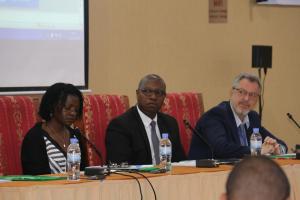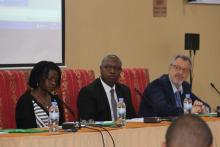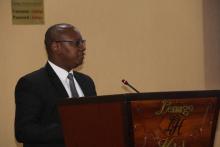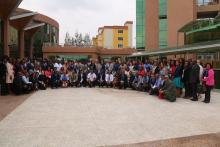ESA EPI Managers and partners meet in Kigali to deliberate on immunization
20 March 2018, Kigali – Nearly two hundred participants from East and Southern African (ESA) countries including EPI managers and partners are attending a three day annual EPI Managers’ Meeting for ESA in Kigali, Rwanda, to deliberate on the progress and remaining challenges in immunization in the sub region, in order to reduce morbidity, mortality and disabilities due to vaccine preventable diseases.
The meeting was officially declared opened by Rwanda’s Minister of State for Public and Primary Health care, Dr. Patrick Ndimubanzi who called on the participants to focus their collective efforts to ensure vaccination for the unreached children. He added that countries in the sub region had endorsed the Global Vaccine Action Plan (GVAP) and the Addis Declaration on Immunization and had scored significant successes in preventing deaths, illnesses and disability.
“In Rwanda, currently 12 antigens are being used in routine vaccination. Now 93% of our children are fully vaccinated and child mortality has reduced over the last 10 years, despite these achievements many gaps still need to be filled,” Dr Ndimubanzi said.
He called on governments, development partners and Public/Private Partnerships to continue supporting vaccination and other child health interventions to end the unnecessary disability and death caused by failure to vaccinate.
“I hope this meeting come up with clear strategies to reduce the number of unvaccinated children and solutions to the number of issues hindering vaccination programmes,” the state minister said.
Speaking on behalf of the WHO Representative to Rwanda, Dr Olushayo Olu, Officer in Charge of the Rwanda WHO office, Dr Juliet Bataringaya reminded the participants that while immunization is a human right, a significant number of children from most African countries were at risk of dying from vaccine preventable diseases. In this regard she called on participants to discuss and develop clear actions to reach the unreached children with immunization services.
“A child born in a typical low-income country in Africa is 17 times more likely to die before reaching the age of five compared to a child in high income countries. Thus, I urge you all to redouble your efforts for the survival of the African child,” she said.
Dr Bataringaya congratulated the ESA countries for not having had any reported Wild poliovirus cases since 2014. She hastened to add that some countries in the sub region were grappling with measles and rubella outbreaks and circulating Vaccine Derived Polio Viruses outbreaks which threaten the efforts to achieve GVAP targets.
She highlighted the need for countries to discuss the challenges such as the increase of vaccines in the immunization schedules, ensuring that children complete vaccination schedules and reaching older age groups with vaccines.
The UNICEF representative to Rwanda Mr Ted Maly also called on participants to focus coming up with ways of closing the immunity gap. He urged participants to develop strategies to integrate immunization with other health services, strengthen health systems and to ensure that everyone has access to vaccines according to GVAP recommendations.
For the next three days EPI Managers and partners will deliberate on immunization issues including the Mid-term review outcomes of the Regional Strategic Plan on Immunization, 2014-2020, routine immunization, new vaccine introduction, Accelerated Immunization Initiative, Polio Eradication and how to address funding gaps. They will also share best practices in various components of immunization, experiences with new vaccines and new innovations, resulting in the meeting agreeing on recommendations to improve immunization service delivery in the ESA sub region.
Participants are drawn from Ministries of Health, WHO, UNICEF, CDC, CHAI, Gavi, JSI, PATH, USAID, and American Red Cross.







